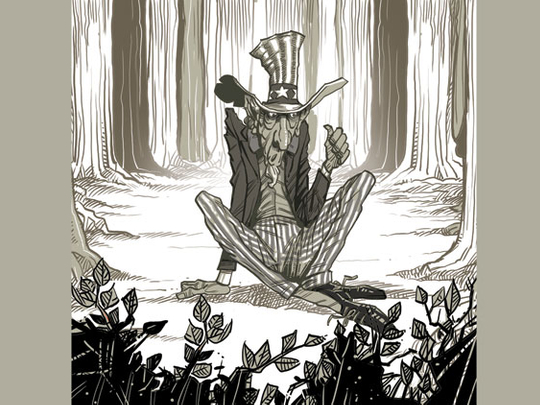
One of the various criticisms made about the reduction in US military aid to Egypt is that it will weaken American leverage in the Arab world’s most populous country. In reality, however, Washington had already lost much of its influence. This process dates back to the toppling of Hosni Mubarak in February 2011, when US President Barack Obama came under heavy criticism for his initial silence over the popular revolution. Mubarak was reviled not just for his decades of dictatorial rule, but also his subservience to the US, paid for by its large annual sums of predominantly military aid.
Washington’s leverage has continued to weaken ever since, with accusations by both sides of Egypt’s political divide of meddling and bias. Yet, the US is also criticised for not doing enough, stemming from what looks like a policy of fence-sitting and half measures. This seems to reflect an attempt to perform a tricky balancing act in a highly polarised country, but it has resulted in indecision, ineffectiveness and irrelevance.
In trying to please everyone, Obama has achieved exactly the opposite. There is widespread anti-American sentiment in today’s Egypt, as well as a strong sense of public defiance against the influence that Washington’s aid has afforded it since the peace treaty with Israel was signed in 1979. America’s declining clout in Egypt is part of a wider regional trend in the wake of the Arab Spring. Close, obedient allies — Mubarak, Tunisia’s Zine Al Abidine Bin Ali and Yemen’s Ali Abdullah Saleh — have been toppled by people mindful of the US role in propping up these dictators, who for so long trampled on their basic rights and denied them their freedoms.
Libya
Much of the opposition to Nato’s US-led intervention in Libya boiled down to fears that the country would become another of America’s Arab puppets. Libyans are certainly grateful for the help they received in ousting a brutal dictator, but the country post-Muammar Gaddafi is not exactly cosy with the US — far from it. The government in Tripoli is an ally, but it has little control over a country that is run by myriad warring militias and whose very territorial integrity is under threat. The most recent of many stark examples of the government’s weakness is the brief kidnapping last week of Prime Minister Ali Zeidan by a group supposedly allied with Tripoli. The militias have forcefully and successfully opposed the government’s attempts to co-opt them under a national army. US support for Tripoli’s efforts in this regard has made it an enemy of the militias, who see it as a plot to weaken and undermine them.
The ensuing lawlessness, insecurity and violence have provided fertile ground for Al Qaida and other Islamist extremist groups vehemently hostile to the US. One of the most headline-grabbing events in Libya last year was the attack on the American Embassy in Benghazi, which killed the ambassador and other staff.
Syria
Similarly, opposition to the revolution against President Bashar Al Assad stems largely from the belief (whether genuinely held or deliberately manufactured) that it was instigated, and is being orchestrated, by the US. The fallacy of this conspiracy theory is a subject for another article, but the revolution, and Al Assad’s deadly reaction to it, did provide Washington an opportunity to help the Syrian people, even if for purely selfish reasons. However, Obama could not have handled it any worse. His support for the opposition has been largely verbal, while material aid has been woefully lacking. The latter is exactly what Syrian rebels have been pleading for, in the face of the massive and constant military assistance that Al Assad’s army receives from his foreign allies and the well-documented brutality of his forces.
Unsurprisingly, this has caused increasing resentment with the Syrian opposition towards the US. Obama’s policy is actually hurting their cause — it provides merely the illusion of US backing, while bolstering the ranks of those who claim that the revolution is simply an American imperialist venture. The lack of material support has affected moderate rebel groups in particular, since their jihadist counterparts have other suppliers.
This has facilitated the radicalisation of the armed opposition, with moderates losing ground to extremist forces. The subsequent infighting is greatly benefitting Al Assad, whose troops have been regaining momentum. The US has created a self-fulfilling prophecy — its reluctance to provide arms, for fear of bolstering radicals, has achieved exactly that.
Future prospects
The Arab Spring was a natural reaction to decades of totalitarianism, with many of the region’s dictators — past and present — backed by the US, which nonetheless repeats its hypocritical platitudes about freedom, human rights and democracy. The uprisings have thus posed a direct and serious challenge to a stagnant regional order that had long been nurtured by Washington. It is unsurprising, then, that its regional hegemony is taking a big hit.
The revolutions against Arab autocrats opposed to the US — and widespread regional revulsion at the policies of Iran, Russia, China and Hezbollah — gave Washington a chance to rehabilitate its status. However, it has squandered such opportunities through indecision and wrong decisions. The world’s only superpower is losing relevance in much of the Arab world. Whether this process is terminal is open to debate, but the US is unlikely to ever fully regain the predominance that it had enjoyed for so long.
Sharif Al Nashashibi is an award-winning journalist and analyst on Arab affairs.









